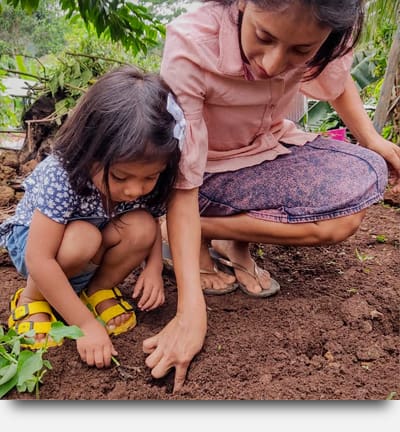Project Director Armando Astorga and Sr. Extensionist Julio Lopez discuss integrating the Seeds Program in diverse communities.
Sustainable Food Security
Long-term food security begins with collaboration and training, laying the foundation for long-term health and increased opportunities.
Each family’s home garden begins with a conversation—about health needs, daily meals, and what’s possible with the space available. From there, families and team members work together to grow gardens that improve lives, season by season.
Our Training for Sustainable Food Security and Nutrition Incorporates These Primary Areas:
• Permaculture Gardens - Extensionists train and mentor families for one year, sharing permaculture and regenerative farming techniques for growing nutritious and healthy foods that can be mixed into traditional recipes.
• Small Animal Production - Extensionists train and demonstrate best practices for raising chickens, rabbits, and other small animals, which provide critical protein resources for physical growth, cognitive development, and improved overall health.
• Composting - Composting training allows appropriate household waste to improve garden soil and sustainability.
• Access to Potable Water - Highly effective, long-lasting water filters curtail severe illnesses; not boiling water reduces deforestation and generates less smoke.
• Climate Flexibility - vital for maintaining year-round production in diverse and changing climates.
“We like Seeds for a Future very much because it
does not just give things, but it teaches us.”

Why is Sustainable Food Security a Priority of Our Program?
Immediate food aid can be critical in emergencies and ongoing unrest, while a long-term, sustainable food security program provides consistent access to nutritious food, better health, and increased economic opportunities for generations to come.
Effective long-term programs build a foundation for sustained familial and community knowledge, creating stable platforms for generational resilience and self-reliance.
Over a 12-month period, our field team members provide weekly hands-on training and mentoring to Program participants. This ensures they have the knowledge and skills to operate independently and maintain their home nutrition gardens and animals for consistent food production.
The increase in nutrient-dense foods in conjunction with nutrition and health education training provided by the Seeds Program lowers chronic illness and disease, such as physical and cognitive stunting, which has long plagued rural Guatemala.
To connect with us about the Seeds for a Future Program, Contact Us.
The Seeds Training Program Provides Vital Focuses and Impacts for Families and Communities:
- Long-Term Focus – Ensuring families and communities can consistently produce much of their own food, allowing for improved nutrition, consistent food availability, reduced chronic illnesses, and increased economic opportunities.
- Education – Nutrition training, such as the First 1,000 Days training for mothers and infants, in concurrence with overall health and hygiene training, provides a multi-generation knowledge base for healthier, self-reliant lives.
- Sustainability – Permaculture practices and small animal production provide reliable nutritional sources, especially for mothers and infants.
- Potable Water Access - Safe, clean water prevents illness and maintains good health.
- Increased Economic Opportunities – Excess production of fruits, vegetables, and poultry can be sold locally. A double win, families spend less money on food while profiting from their own resources.
- Uplifting Women and Families – Women are empowered to produce nutritious food for their families while often having the opportunity to sell the excess, creating micro-business opportunities.
- Community Engagement and Ownership – Communities involved in their food security decisions and production become more resilient and sustaining with increased health and opportunities.
- Monitoring, Evaluation, and Adaptability – What is watched grows. Clear metrics track progress, and participant feedback allows a program to flex and sustain.
Let's Stay Connected
Receive our latest stories and updates about restoring nutrition and health, the impact of sustainable change, and the power of self-reliance.
Our Partners:







